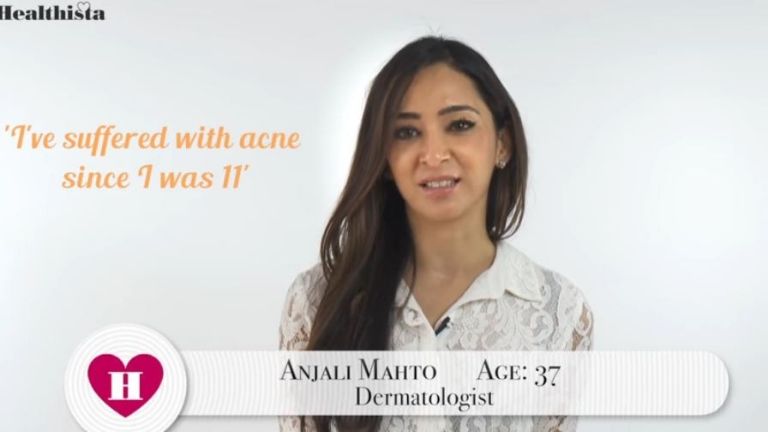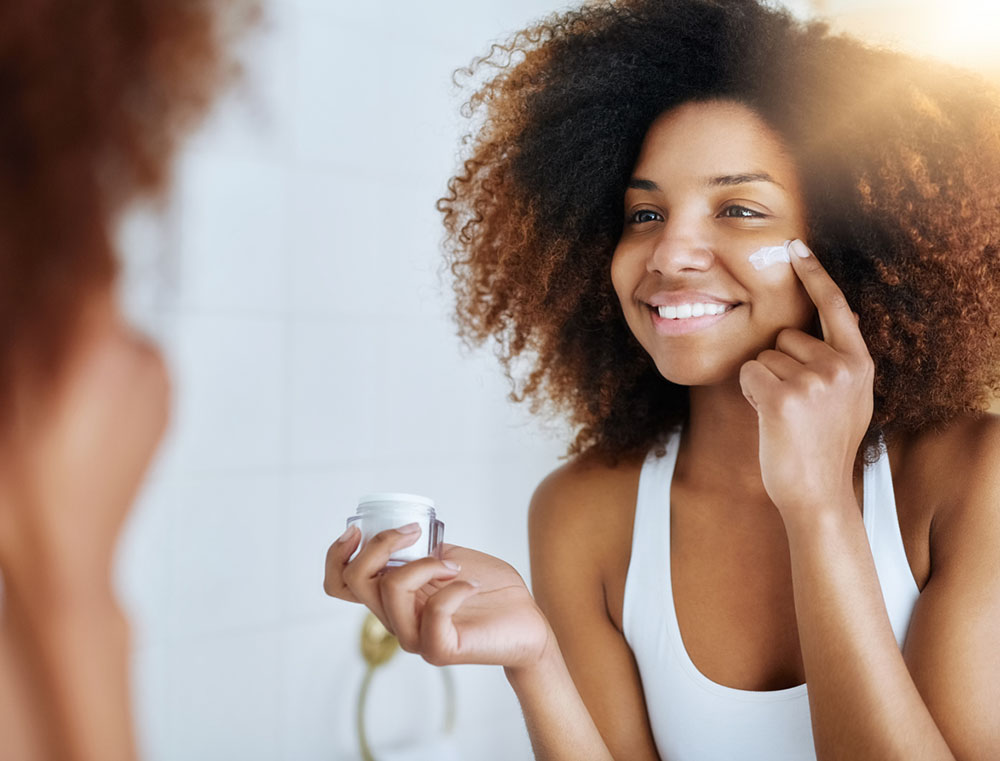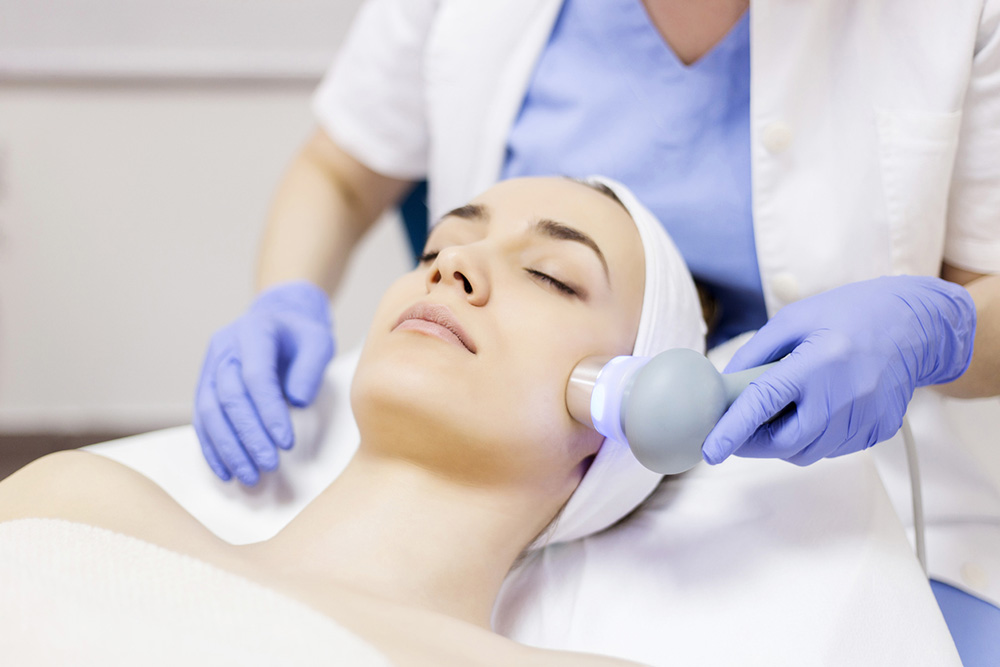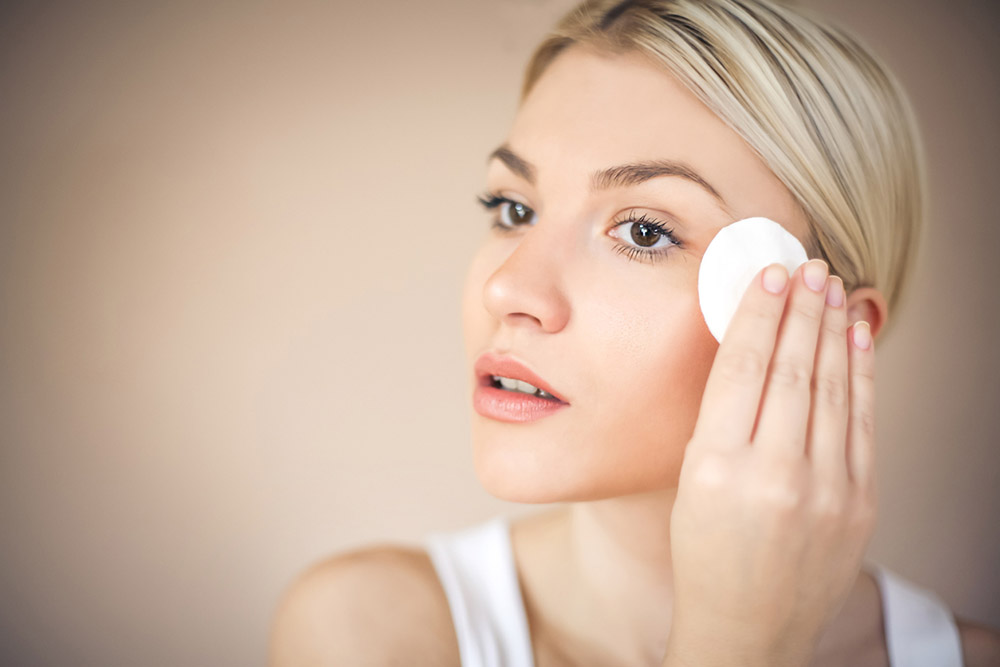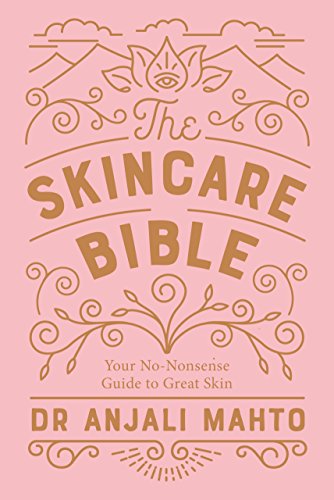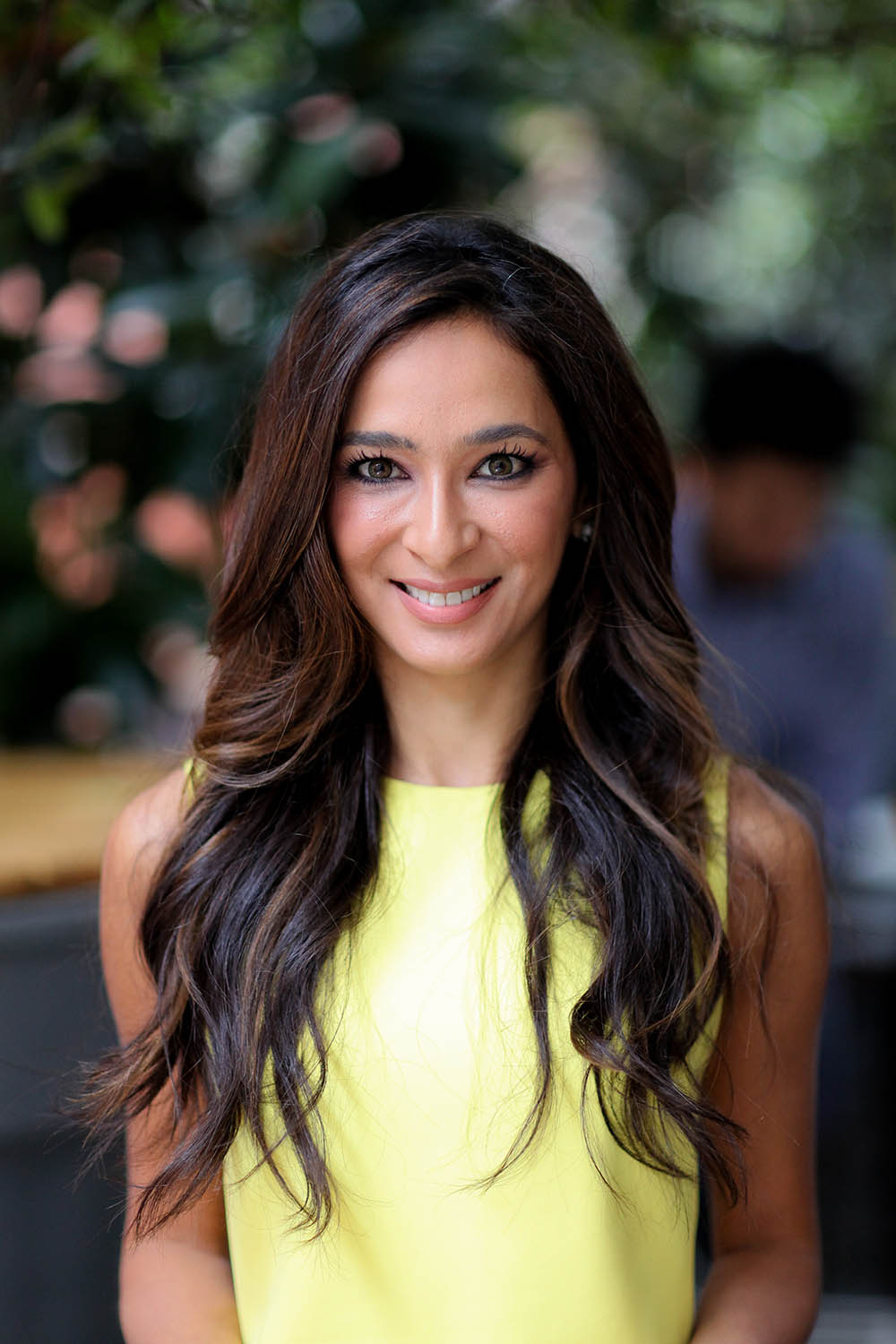Actress Bella Thorne claimed that the key to reducing her acne was NOT washing her face in the mornings. We asked Dr Anjali Mahto – who suffered from adult acne herself – some burning FAQs and her top tips to getting clearer skin
You may have thought that washing your face was a crucial step in your skin care routine – especially if you are suffering from acne.
In a video posted by Vogue, actress Bella Thorne claimed that overwashing may actually have been a primary cause of her skin woes.
When it comes to getting clearer skin – each person is different. We’ve all heard myths and misinformation about miracle remedies that promise to improve our skin.
‘Make sure you’re changing your pillowcase regularly’, ‘holding your phone to your face causes acne – use hands free’, ‘are you washing your hands frequently to avoid build up of bacteria.’ I’ve heard all the alleged advice possible on how to treat my skin and prevent adult acne as well as endless recommendations on products to use.
Many people, myself included, invest heaps of money in skincare products that claim they will help prevent our acne and breakouts. It can be difficult to know what products to use and what advice is truly trustworthy.
Dr Anjali Mahto’s book The Skincare Bible was inspired by exactly this and the questions she’s asked everyday at her clinic, The Cadogan Clinic in London.
Her book is full of unbiased and expert-led advice to help you understand your skin type and to help you take control of your skincare routine.
WATCH: Dr Anjali Mahto’s top tips for acne skincare
So, I wanted to ask Dr Anjali Mahto some questions of my own along with other important FAQs about adult acne. Here’s what she said:
Q. #1: Does what I eat affect my skin, or is it just a myth?
‘There is emerging scientific data that consumption of foods with a high glycaemic index (GI) (the naughty high sugar foods including white rice) and certain dairy products (in particular, low-fat milk) can aggravate acne. These foods that are rapidly absorbed by the body, and result in raised blood sugar or glucose levels’.
‘Raised circulating blood sugar or glucose levels promote the release of the hormone insulin and IGF-1 (insulin growth factor 1).
Both of these increase oil or sebum production and act on the body to produce more male hormones known as androgens (both men and women have androgens). All these factors together are thought to promote the development of acne’.
‘Therefore, in some individuals, it may help to limit these types of food, and I would also suggest following a nutritional diet with plenty of whole grains, vegetables and pulses’.
‘Stress can anecdotally also play a part in aggravating inflammatory skin conditions such as acne. Learn to de-stress and make sure you get enough sleep and exercise. Participate in activities such as yoga and meditation if this works for you’.
Q. #2: Will drinking lots of water help my skin or is that a myth too?
‘I always recommend keeping yourself fully hydrated throughout the day, particularly during the warmer months or if you are suffering from sunburn, as this encourages fluid loss through the skin and can cause you to become very dehydrated’.
Drinking a lot of water will not help with fine lines and wrinkles
‘The skin also loses more water content as we sleep compared to during the day which can be a problem for normal or dry skin types. Always ensure you moisturise before bed as this is when your skin needs its extra moisture’.
‘Drinking a lot of water will not help with fine lines and wrinkles, however and this is a common myth that often gets thrown about’.
Q. #3: Are spots caused by hormones?
‘Yes absolutely. Skin concerns can often be attributed to hormonal changes that take place during the course of one’s life and particularly during certain periods including puberty, pregnancy and the menopause. These hormones can wreak havoc on our skin in a rather predictable manner during these times’.
Q. #4: If I treat my oily skin will it then dry my skin out and cause wrinkles?
‘I always recommend to follow the correct skincare regime for your skin type and those with oily skin should not worry about treating this if they use the correct products and ingredients. Remember that good quality skincare need not be expensive or complicated. More often than not, it comes down to using products that contain the right ingredients’.
‘Most people will have skin types that fall into one of the following categories: oily, dry, sensitive, normal/combination. A person’s skin type can change over time and skincare will also need to change in response to this’.
‘One of the most common errors in those with acne or oily skin is over- exfoliation in an attempt to unblock pores and remove oil. This is not a good idea, as exfoliating frequently with harsh agents will cause irritation and potentially a worsening of break-outs’.
‘I also suggest using cosmetic products that are non-comedogenic and contain ingredients such as Benzoyl peroxide, Alpha-hydroxy acids (AHAs), Salicylic acid, Retinols, Niacinamide and Tea Tree Oil’.
One of the most common errors in those with acne or oily skin is over- exfoliation in an attempt to unblock pores and remove oil
‘It’s important to choose a cleanser specially formulated for acne, such as Avene Cleanance Cleansing Gel or La Roche-Posay Effaclar Foaming Gel Cleanser.
‘After cleansing, use a light gel-based moisturiser that is ‘non-comedogenic’ (i.e. prevents the formation of blackheads), such as Neutrogena Oil-Free Non Comedogenic Moisturiser. Even oily skin needs moisturising as oils do not equate to hydration!’
We also love: Green People, Clear Skin Moisturiser (£11)
‘Treating oily skin however will not result in wrinkles as wrinkles occur due to the natural ageing process of the skin and sun exposure, not due to removal of skin oil as such’.
Q. #5: Does an alkaline diet really work?
‘My recommendation is to follow a nutritional diet with plenty of whole grains, vegetables and pulses. Stress can anecdotally also play a part in aggravating inflammatory skin conditions such as acne so activities to de-stress are important. I would not personally recommend an alkaline diet and there is little scientific evidence to back its use’.
Q. #6: What can you do for scarring post acne as an adult? Is it ever too late and how expensive is it?
‘Acne scarring typically occurs in association with spots that cause deep inflammation (nodules and cysts) and can either be elevated or depressed from the skin surface’.
‘Whilst some acne scarring will improve over time, the skin contour does not usually completely normalize. There are a number of methods that can be used to treat acne scarring if it is causing distress. Sometimes a combination of treatments may be required to get the best result as one person may have several different types of scars. Common treatments include a mixture of microneedling and laser depending on the scar types’.
‘Misleading information results in much time, money, and effort being wasted on miracle cures without miracle results. There are effective treatments available for managing acne and scarring. If you find your skin concerns are stopping you leading your life the way that you want, it is important to seek medical help’.
‘Ensure your expert is a dermatologist on the GMC specialist register and can talk through the multiple options that are available. It is important to have a discussion about which methods have been chosen and why. And finally, it is vital that the acne process itself is switched off and treated before any scar treatments are started’.
Q. #7: How can I help to prevent my acne?
‘Unfortunately, there is no way of preventing acne as it can be caused by a wide number of issues or periods in your life as mentioned above. There are however many treatment and product options to help reduce the signs and symptoms of acne and an expert dermatologist will be able to determine the best treatment plan tailored to you’.
Q. #8: Should I avoid face oils if I have acne?
‘Facial oils have gained much notoriety in recent years. They are touted as being good for all skin types– oily skin included. The theory is that ‘like dissolves like’ and, therefore, oil will dissolve oil. I have seen little evidence to back up the claim that facial oil is good for those of us prone to spots and my advice would be to steer clear of these unless you have dry or very dry skin. Oils on the skin can promote the formation of blackheads, leading to spots’.
Q. #9: After so long of not having acne, why has it started now I‘m in my 20s?
‘Acne can affect us throughout the different stages of our lives. Anecdotally, there seems to be data that suggests that acne is starting earlier and continuing for longer than previously noted’.
women are much more likely to suffer with acne during adulthood than men
‘Acne manifests itself in a variety of ways from blackheads and whiteheads to more severe and tender red spots, and it is estimated that 85 per cent of teenagers will suffer from acne at some point to varying degrees of severity.
During adolescence, acne is more common in males than females. However, women are much more likely to suffer with acne during adulthood than men, probably due to their complex hormonal cycles which fluctuate due to things like inflammation and stress’.
‘Unfortunately, we don’t have a full understanding of the difference in the cause of acne in teens versus adults at this stage. Skin concerns can often be attributed to hormonal changes that take place during the course of one’s life. There are certain periods, namely puberty, pregnancy and the menopause, where this holds particularly true’.
Q. #10: At what age should I start keeping up a skin routine?
‘The correct skincare regime for your skin type should be used as early as possible, particularly from your teens when puberty has kicked in and you are more susceptible to hormonal changes. Your skincare regime needn’t be complicated or expensive as long as you are using the correct ingredients to suit your skin type’.
Q. #11: What should be my everyday skin routine?
‘As mentioned above, your skincare routine should reflect your skin type. I do recommend cleansing the skin twice a day – morning and evening. This can be in the form of a cream cleanser or micellar water. I also suggest exfoliating your skin as this helps to remove the upper layer of dead skin cells that sit on the skin – this improves the skin’s texture, age spots and uneven skin tone which ultimately allows for better penetration of skincare products such as moisturisers or serums’.
Healthista loves: Skin Blossom, Facial Cleansing Milk (£6.95)
‘Facial toners also have a number of positive roles in skincare. They can remove excess oil and make up and balance the pH of your skin. Toners are useful for those with very oily or acne prone skin. They should be applied to a cotton pad and wiped over the skin surface’.
‘Serums contain high concentrations of active ingredients and should be used before moisturisers. They are fast acting and lightweight. A few drops of serum can be placed in the palms of the hands and pressed into the skin in a similar manner to using essence. Using serums on damp skin may increase their penetration as damp skin is more permeable to products’.
Q. #12: How can I help acne caused by hormones especially at that ‘time of the month’?
‘Acne is normally worse during your period and this is a very common issue for women and one that many have simply come to accept as part and parcel of that time of the month. About two- thirds of acne-prone women will note worsening of their acne typically occurring anywhere from a week to a few days before the start of their period’.
‘Though women have female hormones circulating through their bodies throughout their menstrual cycle (oestrogen predominating in the first half of the month and progesterone in the second half), the androgen testosterone is also present – albeit in smaller quantities – at all times’.
About two- thirds of acne-prone women will note worsening of acne anywhere from a week to a few days before the start of their period’
‘Shortly before the onset of menstrual bleeding, female hormones reach their lowest levels; the level of testosterone, however, remains fairly constant at all times and so its proportion is relatively higher at these points. Such higher proportions of testosterone, in turn, are known to cause the changes in the skin’s complexion that bring about acne. Unfortunately, us ladies are at the mercy of our hormonal cycles and there’s not much we can do about them, even if we can treat the resultant acne’.
Dr Anjali’s 5 best skincare tips for acne:
#1: ‘Wear sunscreen daily. Daily sunscreen use can help guard against skin cancer and premature skin ageing. Choose a broad-spectrum which offers protection against both UVA and UVB light. Sunscreen should be a minimum of SPF 15–30’.
#2: ‘Remember that good quality skincare need not be expensive or complicated. More often than not, it comes down to using products that contain the right ingredients’.
#3: ‘It is important to cleanse the skin twice a day – morning and evening. This can be in the form of a rinse of cleanser or micellar water. Air pollution (polycyclic aromatic hydrocarbons, volatile organic compounds, oxides) has been shown to contribute to premature skin ageing such as fine wrinkles and pigmentation spots. These should not be left in contact with the skin for any longer than necessary’.
#4: ‘It is really common to hear myths about pore size – for example – steam or hot water will open pores. This myth is propagated by glossy magazines, beauticians, and even some doctors! The truth is we can help improve the appearance of pore size but we cannot close them’.
#5: ‘Skin concerns such as acne scarring can have a profound psychological effect on the sufferer long after the acne itself has gone. Misleading information results in much time, money, and effort being wasted on miracle cures without miracle results. There are effective treatments available for managing acne and scarring. If you find your skin concerns are stopping you leading your life the way that you want, it is important to seek medical help’.
The Skincare Bible: Your No-Nonsense Guide to Great Skin by Dr Anjali Mahto, Consultant Dermatologist at Skin55, is available to buy on Amazon.
Dr Anjali Mahto is a UK-trained consultant dermatologist who has worked in both the NHS and private clinics. She began her career as a junior doctor before moving into dermatology after suffering acne for over a decade.
She writes regularly for the Huffington Post and has featured extensively in popular media and women’s magazines, including Guardian, Good Housekeeping and Sky News. She is a spokesperson for the British Skin Foundation.
More Healthista content:
This skin doctor has had acne since she was 11 – here’s how she beat it
What it really feels like to have severe acne
Exactly what this anti-ageing doctor has had done herself
10 best natural eye creams for every skin need
How to get rid of dark circles – tear trough fillers explained by a doctor
Like this article? Sign up to our newsletter to get more articles like this delivered straight to your inbox.



